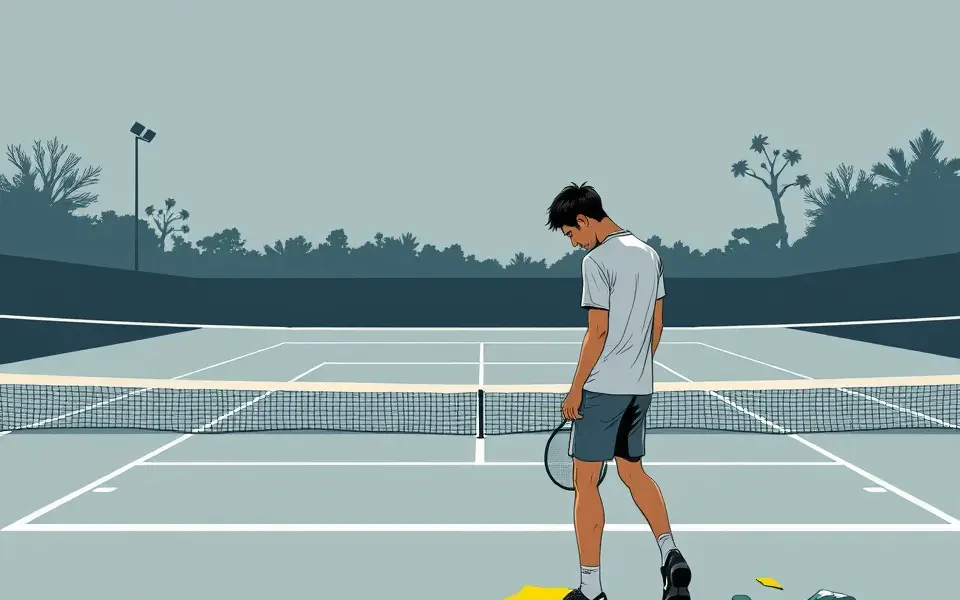Stefanos Tsitsipas, once a mainstay in the top echelon of men’s tennis, is experiencing a significant shakeup in his career. Following a stunning defeat at the French Open to Italian qualifier Matteo Gigante, his ranking is set to plummet outside the top 20 for the first time in nearly seven years. This loss not only marks a low point in his recent performance but also raises questions about his future trajectory in the highly competitive world of professional tennis.
The Shocking Defeat at Roland Garros
At the 2025 French Open, Tsitsipas, seeded 20th, faced Matteo Gigante, a world number 167, in the second round. Despite entering the match with a strong record on clay and previous successes at Roland Garros – including a final appearance in 2021 – Tsitsipas was unable to overcome Gigante’s determined performance. The Italian qualifier secured a 6-4, 5-7, 6-2, 6-4 victory, marking his first-ever win against a top-20 player and a significant milestone in his career.
Gigante, with only one previous Grand Slam appearance, showcased composure and aggression throughout the match, saving crucial break points and capitalizing on Tsitsipas’ inconsistencies. This win propelled him to a projected ranking of 129th, a considerable jump from his previous position.
Tsitsipas’ Perspective on the Loss
In the aftermath of the defeat, Tsitsipas candidly addressed his performance, acknowledging lapses in focus and maturity. He admitted that his recent results accurately reflect his current ranking and that he needs to improve every aspect of his game to compete with the world’s best.
“I believe that I am right where I am, my results have shown it,” Tsitsipas stated. “There is nothing that is unfair. The fairest thing on the tour is the world ranking, which highlights the best players. To put it simply, the ranking doesn’t lie.”
He further expressed that his self-confidence has taken a hit and that he is working to regain it. Tsitsipas recognized the challenges ahead, describing the current situation as “a mountain in front of me.”
Ranking Fallout: Dropping Out of the Top 20
The loss at Roland Garros has significant implications for Tsitsipas’ ranking. He is projected to fall to around number 25, his lowest since August 2018. This drop signifies the end of his remarkable streak within the top 20, a testament to his previous consistency and success.
How ATP Rankings Work
To understand the impact of this loss, it’s essential to grasp how the ATP (Association of Tennis Professionals) rankings operate. The ATP rankings are calculated on a 52-week rolling basis, where a player’s ranking is determined by their best results over the past year. Points are awarded based on tournament size and the stage a player reaches.
- Point Distribution: Grand Slam tournaments offer the most points (2000 for the winner), followed by ATP Masters 1000 events, ATP 500 events, and ATP 250 events.
- 52-Week Logic: Points earned at a tournament last for 52 weeks. When that tournament is played again the following year, the player’s points from the previous year are dropped and replaced with the points earned in the current year.
- Best Results: The ATP counts a player’s best 19 results in singles over the past 52 weeks.
Failing to defend points from previous successes can lead to a significant drop in ranking. In Tsitsipas’ case, his early exit from the French Open meant he could not defend the points he earned from reaching the quarter-finals in 2024, contributing to his ranking decline.
Analyzing Tsitsipas’ Recent Struggles
Tsitsipas’ drop in ranking is not solely attributed to the French Open defeat. His performance over the past year and a half has been inconsistent, with early exits in several major tournaments.
- Early Grand Slam Exits: He has failed to advance beyond the fourth round in seven of the past eight Grand Slam tournaments.
- Inability to Defend Titles: A failure to defend his Monte Carlo Masters title earlier in the season further contributed to his downward spiral.
Despite winning the ATP 500 event in Dubai earlier in the year, his overall performance has not been up to par with his earlier achievements, resulting in a decline in his ranking and confidence.
Potential Reasons for the Dip in Form
Several factors could be contributing to Tsitsipas’ recent struggles:
- Mental Game: Tsitsipas himself has acknowledged a dip in self-confidence, which can significantly impact a player’s performance. Tennis is as much a mental game as it is a physical one, and a lack of confidence can lead to tentative play and poor decision-making.
- Increased Competition: The level of competition in men’s tennis is constantly rising, with new players emerging and established stars continually improving. This makes it increasingly difficult to maintain a top ranking.
- Tactical Adjustments by Opponents: Opponents may have identified weaknesses in Tsitsipas’ game and developed strategies to exploit them. In professional tennis, continuous adaptation and evolution are crucial for sustained success.
- Pressure and Expectations: As a former world number three and a Grand Slam finalist, Tsitsipas faces immense pressure and expectations. The weight of these expectations can sometimes hinder performance.
The Road Ahead: Can Tsitsipas Reclaim His Spot?
Despite the recent setbacks, it’s crucial to remember Tsitsipas’ past achievements and potential for future success. He has reached two Grand Slam finals, won the ATP Finals in 2019, and consistently been a top-ranked player for several years. The question now is, how can he regain his form and climb back up the rankings?
Key Strategies for a Comeback
- Mental Reset: Addressing his self-confidence is paramount. Working with a sports psychologist or mental coach could help him regain his focus and belief in his abilities.
- Tactical Adjustments: Analyzing his game and identifying areas for improvement is essential. This may involve refining his serve, improving his net play, or developing new strategies to counter opponents.
- Coaching Changes: Tsitsipas has recently made a significant coaching change by joining forces with Goran Ivanisevic, former coach of Novak Djokovic. Ivanisevic’s experience and expertise could provide a fresh perspective and help Tsitsipas revamp his game.
- Consistency in Training and Preparation: Maintaining a high level of consistency in training and preparation is crucial. Elite players never take their opponents lightly and prepare rigorously for every match.
- Focus on the Process: Instead of fixating on rankings and results, Tsitsipas needs to focus on the process of improvement and development. By setting smaller, achievable goals and focusing on the present, he can gradually build momentum and confidence.
- Embrace Challenges: Use setbacks as opportunities for growth and learning. Analyze what went wrong in previous matches and identify areas for improvement.
Upcoming Opportunities: Grass and Hard Courts
The upcoming grass-court season, followed by the hard-court season, presents opportunities for Tsitsipas to turn his season around. He has expressed optimism about performing better on grass and will be looking to make a strong showing at Wimbledon.
- Wimbledon: While historically not his strongest Grand Slam, a successful run at Wimbledon could provide a significant boost to his ranking and confidence.
- US Open: The North American hard-court swing, culminating in the US Open, offers another chance to accumulate ranking points and regain momentum.
The Mental Game and Overcoming Lower-Ranked Opponents
Losing to a lower-ranked opponent can be particularly challenging for a top player. It can lead to self-doubt and put additional pressure on future matches. However, it’s essential to remember that rankings don’t always dictate the outcome of a match.
Psychological Factors
- Avoiding Complacency: Higher-ranked players must avoid complacency and take every opponent seriously, regardless of their ranking.
- Focusing on the Game Plan: Developing a clear game plan and executing it effectively is crucial. Rankings don’t help you win the match or formulate your strategy.
- Mental Toughness: Maintaining mental toughness and fighting for every point, even when facing adversity, is essential.
- Not Underestimating Opponents: Players with weaker technique can sometimes be more difficult because you are not used to this type of shot.
Lessons from Upsets
Upsets are a part of tennis, and they serve as a reminder that any player can win on any given day. Learning from these experiences and using them as motivation can be valuable for a player’s growth.
Concluding Thoughts: A Test of Resilience
Stefanos Tsitsipas’ current situation presents a significant test of his resilience and determination. While the drop in ranking is undoubtedly a setback, it also offers an opportunity for him to reassess his game, make necessary adjustments, and come back stronger.
With a renewed focus, a strong support team, and a commitment to improvement, Tsitsipas has the potential to reclaim his place among the top players in the world. The tennis world will be watching closely to see how he responds to this challenge and what the future holds for the talented Greek star.








No Comment! Be the first one.